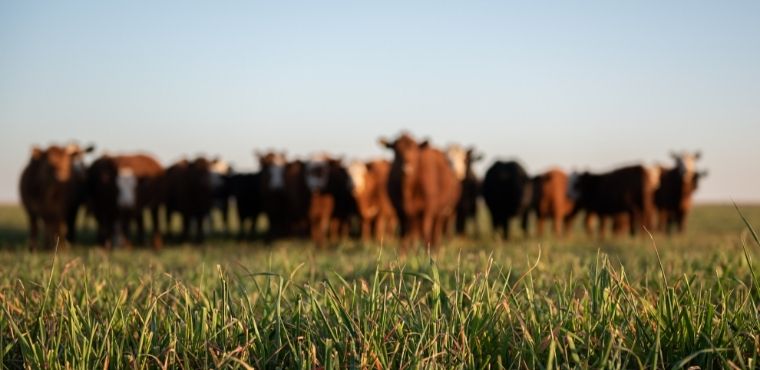By Sarah Cato
U of A System Division of Agriculture
Although cattle prices remain high, Arkansas producers had no shortage of obstacles to keep profit margins thin in 2024.
“What we all know in the cattle industry is that prices are up. When those prices will peak is still a big question,” said Maggie Justice, beef cattle extension specialist for the University of Arkansas System Division of Agriculture. “But prices are high, so when weather started to get hard on us this year, guys started selling again. Because although prices are high, we’re still not seeing the profit margins you’d think we’d see.”
Justice said input costs, paired with some less-than-ideal conditions have left many producers not retaining heifers in their herds.
“With still high input costs, we’re still seeing a big pool of heifers into the feed yards and guys aren’t purchasing heifers to raise and put back into our national herd, so our national herd numbers are still going down,” Justice said. “If we see a high number of heifers in the feed yards, the national herd won’t grow. Because we would have to retain those heifers, grow them so they can keep having calves.”
Environmental challenges
High input costs aren’t the only thing holding cattle producers back. Jonathan Kubesch, extension forage specialist for the Division of Agriculture, said that wet and dry weather impacted hay quality this year.
“Because it was wet for a lot of folks, we had a delayed first cut and so we had over-mature grasses,” Kubesch said. “We had a really good second cut, but for those of us in the fall drought, we didn’t have a third cut.”
While some portions of the state faced conditions too wet to cut, other areas struggled with drought, and heavy armyworm infestations were felt statewide.
“In general, I would say statewide we were at 80 percent of our production potential, but in our really drought affected areas we lost maybe half or more of our production,” Kubesch said. “We had a lot of armyworm pressure dry spell and we were offset on our hay cut schedule.”
Health and disease
Cattle producers also felt the effects of multiple regulatory changes to the industry in 2024, with the biggest change being the availability of over-the-counter antibiotics. The U.S. Food and Drug Administration issued guidance requiring drug manufacturers to change labels on animal antibiotics to require a veterinary prescription. This guidance went into effect in June of 2023.
“This year we finally started to see the full impact of the FDA’s regulation on antibiotics,” Justice said. “Although it went into effect last year, anything that was on store shelves could still be sold. So really this year is when you saw people going to the store and it wasn’t there anymore.”
Justice said while the regulation will help prevent antibiotic overuse, the shortage of large animal and rural veterinarians in the state will be problematic for producers that do not have an established relationship with a veterinarian.
Multiple insects have also been a concern for Arkansas cattle producers this year such as the Asian longhorned tick, known to transmit a protozoan parasite called Theileria orientalis which is deadly for cattle.
“We had our first confirmed death caused by Theileria in June of this year. We confirmed Asian longhorned tick presence in the state prior to this, but this was our first known death,” Justice said. “Although this is scary, the good news is now we know it’s here and we can test for it.”
Justice said because Theileria mimics anaplasmosis, a common disease in Arkansas cattle, awareness and testing will make a huge difference in cattle health.
Screwworm, a devastating pest that was eradicated in the U.S. and Panama in 2006, was recently found in the established “barrier zone” between the U.S. and areas where screwworm is endemic. Because of this the U.S. Department of Agriculture Animal and Plant Health Inspection Service suspended the importation of ruminants from Mexico as of Nov. 22.
“When you think about beef production in general, in an already small national herd, if they’re not importing cattle from Mexico, that will impact us in a couple of months,” Justice said. “Though the USDA is working to resume cattle imports again as soon as possible.”
Those interested can stay up to date on current issues and research-based recommendations for beef cattle production by following Arkansas Extension Beef Systems on Facebook.
To learn more about Division of Agriculture research, visit the Arkansas Agricultural Experiment Station website: https://aaes.uada.edu. Follow on Twitter at @ArkAgResearch. To learn more about the Division of Agriculture, visit https://uada.edu/. Follow us on Twitter at @AgInArk. To learn about extension programs in Arkansas, contact your local Cooperative Extension Service agent or visit www.uaex.uada.edu.
About the Division of Agriculture
The University of Arkansas System Division of Agriculture’s mission is to strengthen agriculture, communities, and families by connecting trusted research to the adoption of best practices. Through the Agricultural Experiment Station and the Cooperative Extension Service, the Division of Agriculture conducts research and extension work within the nation’s historic land grant education system.
The Division of Agriculture is one of 20 entities within the University of Arkansas System. It has offices in all 75 counties in Arkansas and faculty on five system campuses.
The University of Arkansas System Division of Agriculture offers all its Extension and Research programs and services without regard to race, color, sex, gender identity, sexual orientation, national origin, religion, age, disability, marital or veteran status, genetic information, or any other legally protected status, and is an Affirmative Action/Equal Opportunity Employer.






